Does China Invade the Nansei Islands? - A Memo on Preventing War - [反核・平和]
 The following is the English version of the text I contributed to a Kyushu-based peace movement group's circular, "Making the Most of Article 9 from Kyushu*", which will be published soon(The image on the right is the cover of the coming issue). This is to be posted on this blog prior to publication in print.
The following is the English version of the text I contributed to a Kyushu-based peace movement group's circular, "Making the Most of Article 9 from Kyushu*", which will be published soon(The image on the right is the cover of the coming issue). This is to be posted on this blog prior to publication in print.The English translation was done by manually correcting the translation at 'DeepL'. One paragraph and a few images have been added to the English version.
* Kyushu is the westernmost island of Japan and literally means "nine regions", punning on the "9" in "Article 9" of the Constitution.
------
以下は、間もなく発行予定の、九州の平和運動グループのサーキュラー「九州から九条を活かす」に寄稿した文章の英訳です。紙媒体での発行に先行して、このブログに掲載します。
英訳はDeepLの訳を手動で補正する、という方法によりました。英訳に際して文章と画像を少し追加しています。
------
Does China Invade the Nansei Islands?
- A Memo on Preventing War -
K. Toyoshima
contents
1. Introduction
2. Why Japan is Involved in the "Taiwan Incident"?
3. The "Taiwan War" is essentially China's civil war
4. Ignoring legal validity?
5. "Preparedness" is, on the contrary, a factor or pretext for the other side's military buildup -- "Parallel processing" thinking on peace and security issues
6. Departure from "military Keynesianism."
Notes
Summary1. Introduction
The possibility of a war in Japan triggered by the Taiwan "contingency" does not envision a sudden Chinese invasion of the Nansei Islands, but rather a counterattack (possibly a preventive attack) by the U.S. and Japan in whatever form they enter the Taiwan War, which is a cause for concern.
Based on the treaties and joint statements currently in effect between Japan and China, the Taiwan War is a civil war, and Japan cannot intervene in it without abrogating these treaties and statements. The same is true for the U.S., which is currently taking the "one China" position. If it is a civil war, there is no basis under international law for military intervention.
The ongoing conversion of the Nansei Islands into a missile base is a preparation for such illegal military intervention, and the mechanism of the "security dilemma" will raise China's alarm and encourage its military expansion.
An "investment strategy" to curb and abolish the military-industrial complex, one of the driving forces behind military expansion and war, is also important.
Peace through "deterrence" is unstable and merely postpones war. We should recall the preamble of the UNESCO Charter, which states, " since wars begin in the minds of men, it is in the minds of men that the defences of peace must be constructed".
I am not an expert on international politics or military issues, but as I will show below, it is possible to make an argument contrary to the prevailing view that takes military expansion for granted, and in fact, it can be persuasive, even if the argument is completely within the realm of general knowledge and common sense. This is mainly inspired by Motofumi Asai's lecture[1] this summer.
We will also discuss ways to stop this trend of military expansion, to shift public opinion in the direction of peace, and to restore Article 9 to its rightful place.
2. Why Japan is Involved in the "Taiwan Incident"?
According to a report in Asahi on September 2, Taro Aso, vice president of the Liberal Democratic Party (LDP), referring to the Taiwan "contingency," said, "If an engagement were to begin in Taiwan, Okinawa, Yonaguni Island, and Yoron Island would not be considered outside the combat zone, meaning that a war could well break out within the country." He also mentioned the possibility of war breaking out in Japan. He also stressed his "determination to protect his country by himself.
Given the impression of recent military tensions between China, Taiwan, and the U.S., as well as China's reported military buildup and base expansion, and Russia's invasion of Ukraine, many people might think that this might be the case. However, one wonders why war would break out within Japan - in this case, presumably referring to the Nansei Islands. Perhaps they are thinking of a military conflict between China and Taiwan over the unification/independence of Taiwan, which would escalate into war, with the U.S. and Japan getting involved. If, instead, we have to consider the possibility of China suddenly invading the Nansei Islands, much less the Japanese mainland, regardless of Sino-Taiwanese relations, we would naturally have to equally assume that Japan would suddenly invade the Korean Peninsula or China (as it did in the past).
Why, then, would Japan be drawn into a military conflict between China and Taiwan? The only reason is that the Japanese ruling class is willing and ready to intervene in this conflict, or rather, to follow the US in intervening. Instead of Japan intervening in the war from the front, the Self-Defense Forces may join in behind the U.S. war effort, or perhaps, conversely, Japan may provide military assistance to Taiwan, with the U.S. watching from behind. Of course, Japan provides bases to the U.S., especially in Okinawa, and the Self-Defense Forces are said to be under the de facto command of the U.S. military due to the military alliance with the U.S. In the event of war, these Japanese and U.S. bases would naturally become targets of attack by the other side.
3. The "Taiwan War" is essentially China's civil war
What reason do Japan and the U.S. have to be involved in the Taiwan War, which is said to be a crisis in the first place?
Paragraphs 2 and 3 of the 1972 Japan-China Joint Communiqué state that "The Government of Japan recognizes that the Government of the People's Republic of China is the sole legitimate government of China" and "The Government of the People's Republic of China reiterates that Taiwan is an integral part of the territory of the People's Republic of China." Article III of the 1978 Treaty of Peace and Friendship between China and Japan states that the two countries "shall observe the principles of equality and mutual benefit and of non-interference in each other's internal affairs." The U.S. has also adopted the "one China" position for the time being. In other words, if a Taiwan war were to break out, both the U.S. and Japan would have to admit that it would be a "civil war," and they could not get involved in a civil war. China's resorting to force to "unify" Taiwan is not only unjustified, it is the worst possible thing it could do, but that does not mean that a foreign country can prevent it from doing so by force. It would be the same thing that happened not long ago with the forced change of the political system over Hong Kong, breaking the "one country, two systems" promise, and the foreign countries could not intervene in this by military force.
4. Ignoring legal validity?
Despite these legal restrictions, not only politicians such as Aso's statement quoted at the beginning of this article, but also TV scholars and experts are talking about the possibility of Japan's participation or involvement in the Taiwan War, as if it were unavoidable. However, I have not heard any discussion of the justification or legal basis for this from such commentators. What we do hear, however, is a discourse that assumes that such military tensions are a natural phenomenon and takes the increase in defense spending for granted under the heading of "deterioration of the security environment", or does not explicitly oppose such an increase.
For example, Yu Koizumi, a self-proclaimed expert on military issues, in a brief comment on the news (Nikkei, August 31) that the Ministry of Defense had decided on a budget request for FY2023, the largest ever, stated the following. I quote from the first half of the article.
Considering the recent security environment, I am sure that an increase in defense spending is unavoidable. Moreover, Russia's invasion of Ukraine will force the U.S. military to turn its deterrence resources to the European front to a significant degree, so Japan's role in ensuring the credibility of deterrence against China should be quite important.The logic here is that "deterrence by U.S. forces" is assumed as a matter of course, and therefore Japan's natural role is to supplement it, but where else is the original justification or rationale given for this?
According to a internet search of relevant international laws, it seems that the only exceptions to the principle of prohibition of the use of force recognized by the UN Charter are (1) the urgent exercise of the right of individual or collective self-defense in the event of an armed attack, and (2) actions determined by the Security Council as measures against threats to peace, subversion, or acts of aggression. (1) is Article 51 of the UN Charter, and (2) is Article 42. However, Taiwan is not a member state with regard to (1), and (2) must await a decision by the Security Council. The UN Charter is naturally cited as the basis for condemning Russia's invasion, and perhaps Mr. Koizumi is no different, but does he think that the UN Charter does not matter in the case of intervention in the Sino-Taiwanese war by the US and others? Or is there some other legal basis?
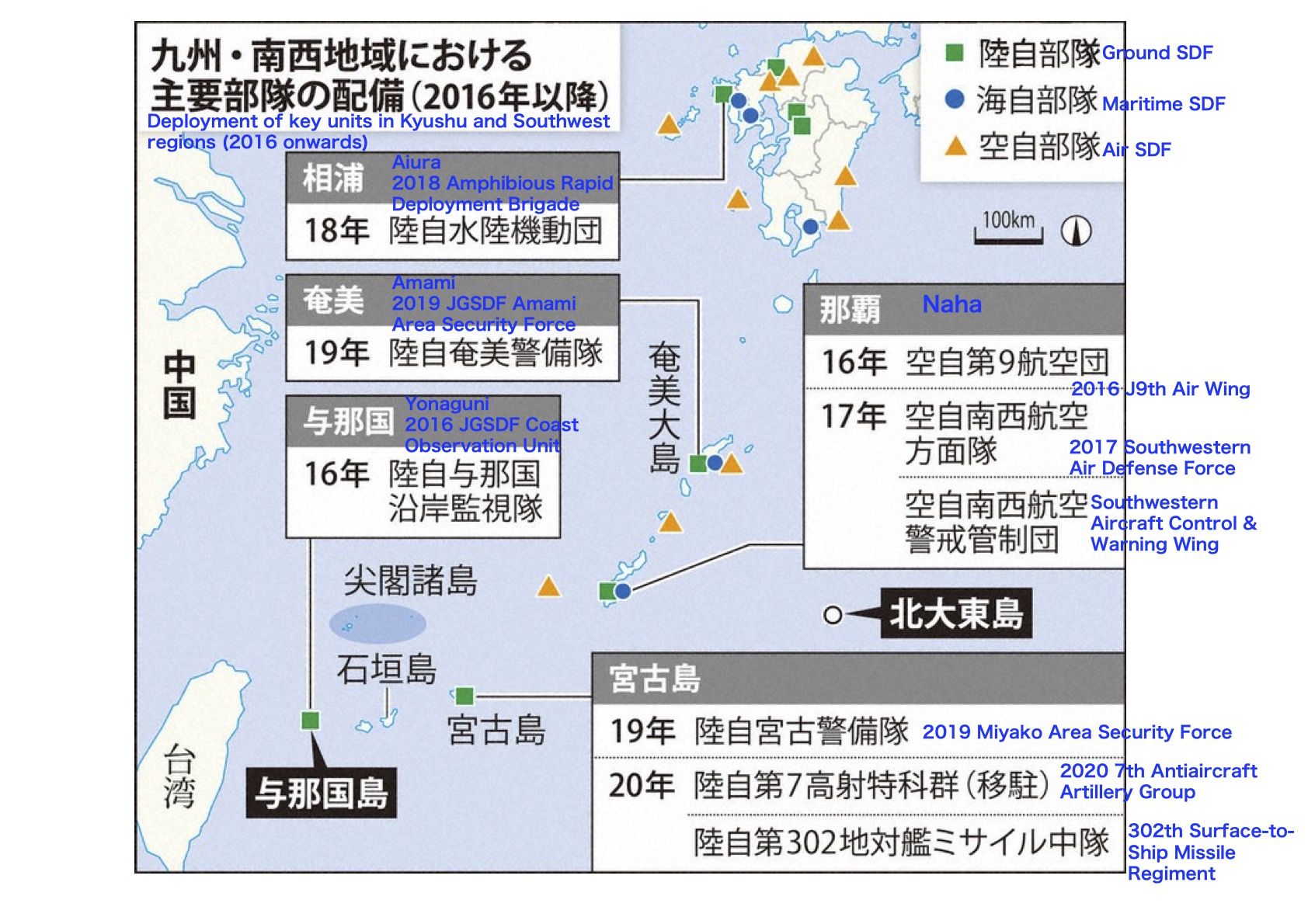 And since Koizumi approves of further increases in "defense spending," he is probably not opposed to the expansion of the Self-Defense Forces to include missile bases in the Nansei Islands. But this will be necessary not against Russia or Korea (DPRK), but precisely in the war over Taiwan. However, as mentioned above, Japan cannot be involved in the Taiwan War, either by treaty or by the UN Charter (of course, this is true from the preamble of the Constitution and Article 9, but I dare not mention them here), so there is no way that Japan can be prepared for this. (The figure on the right is from Mainichi Shimbun, 2022 May 5th issue)
And since Koizumi approves of further increases in "defense spending," he is probably not opposed to the expansion of the Self-Defense Forces to include missile bases in the Nansei Islands. But this will be necessary not against Russia or Korea (DPRK), but precisely in the war over Taiwan. However, as mentioned above, Japan cannot be involved in the Taiwan War, either by treaty or by the UN Charter (of course, this is true from the preamble of the Constitution and Article 9, but I dare not mention them here), so there is no way that Japan can be prepared for this. (The figure on the right is from Mainichi Shimbun, 2022 May 5th issue)If there is no legal basis, then create a situation where legal arguments can be bypassed. The modus operandi is explained by Mr. Kyoji Yanagisawa in his new book, "Security Theory without War", of which he is also one of the co-authors. Let me quote from that part of the book.
In practice, how it would be done is to create a situation in which a US Navy ship is attacked by China, as in the Gulf of Tonkin incident, and the US would enter the conflict on the grounds of its right to individual self-defense. Japan would then join this conflict with the right to collective self-defense, such as protection of U.S. vessels, which was enacted in the new security legislation of 2015. Alternatively, if a U.S. military base in Japan is attacked, an attack on Japanese territory would trigger the right of self-defense under Article V of the Security Treaty, so Japan would have to enter the war as an individual self-defense force.Such a war scenario that circumvents the very law must not be allowed. To this end, the "demilitarization of the Ryukyu Arc" advocated by Kenji Isezaki, co-author of this book, and Makoto Konishi, who has long warned of the problem of Self Defense Force military expansion into the Ryukyu Arc, is important, and we must strengthen public opinion in this direction.
5. "Preparedness" is, on the contrary, a factor or pretext for the other side's military buildup
Even if the expansion of the Self-Defense Forces in the Nansei Islands is purely for the purpose of deterrence, it is undeniably a threat from the perspective of neighboring countries, and through the well-known mechanism of the "security dilemma," it will become a factor in, and even a justification for, the expansion of other countries' military forces. In other words, the very idea of "deterrence" will invite war. China's military expansion may be large in both speed and scale, while Japan's may be relatively small in comparison, but it should be viewed as the military power of Japan and the U.S. as one under the Security Treaty, and of course China would see it that way as well. In reality, the Self-Defense Forces are subordinate to the U.S. military, as mentioned earlier. Of course, there are many U.S. military bases in Japan, especially in Okinawa.
As for Russia's invasion of Ukraine, not only NATO's eastward expansion but also Ukraine's military buildup immediately before may have been a remote cause. It is probably well known that the former at least gave Putin a pretext (a pretext, not a rationale - just in case). Of course, one could argue, on the contrary, that Ukraine's own military buildup was not sufficient to prevent Russian aggression. I don't think there is any methodology that can correctly determine which is right.
Although Taiwan is not a member of the United Nations, 14 countries have diplomatic relations with it and it participates in a variety of international organizations, making it, in effect, an independent country. If China were to attempt to forcefully place such an area and its inhabitants under its control by force, it would be, as already mentioned, completely unjustified. At the same time, foreign intervention may diminish, or even counteract, or even legitimize the injustice of the former. It would give the excuse or reason that it is an unavoidable measure "to prevent the division of the country by force. Perhaps with greater loss of life.
Even if military force is ultimately resorted to, it is the role of politics to exert maximum diplomatic efforts to calm the situation. However, as is the case with the DPRK's missile test, there has been little diplomacy of any kind in the past few years. If the government will not do it, the opposition parties should take the initiative. In May, a citizens' group in Saitama made such a call to the opposition parties, but what was their response?
Peace through military "deterrence" is unstable and at best merely a postponement of war. The English word "deter," which translates to "抑止" (yokushi) in Japanese, a word that seems harmless enough, is derived from the Latin words 'de' and 'terrere,' meaning "to frighten into stopping", according to the Oxford English Dictionary pre-installed on my PC, hence the character "脅止" would be appropriate. Such threats cannot be stable. 'Terrere' is also the root of the word 'terror'.
Here I would like to suggest one way to address the debate about whether it is the demilitarization principle of Article 9 of the Constitution or armaments that will bring about peace. A "sequential" discussion on this issue that begins with the question, "What would we do if we were attacked militarily by a foreign nation?" tends to lead to lengthy exchanges. The author proposes a diagram for thinking about this problem in a "parallel processing" manner, much like a quantum computer, to put it bluntly. Make a table of two columns (arms buildup/elimination) and four rows (gains/losses in peace time and in wartime), dividing the arguments of the arms maintenance/strengthening camp and the arms abolition/reduction camp and their respective advantages and disadvantages into peacetime and wartime(fig.1).
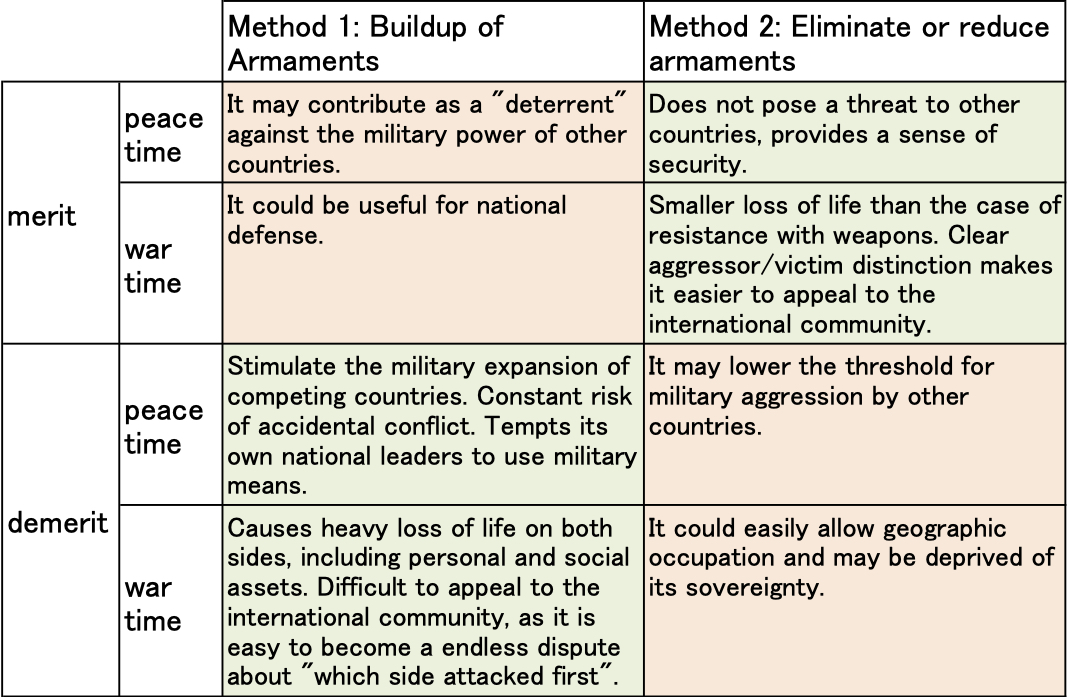
For example, in the column for the advantages of the abolitionist/peacetime camp, it should say, "It does not pose a threat to other countries and gives a sense of security." If we fill in all the possible arguments of the two factions in this table and look over it, we can confirm that there is no such thing as a "perfect" method and that it is a matter of comparison. Next, consider the "time evolution" of this table, i.e., which parts of the table will expand or contract in the case of disarmament/elimination and in the case of military expansion(fig.2). This will show that the case of disarmament and abolition of arms leads to a favorable future. (This paragraph is substantially the same as part of the following blog post. https://pegasus1.blog.ss-blog.jp/2022-11-06#proposal )
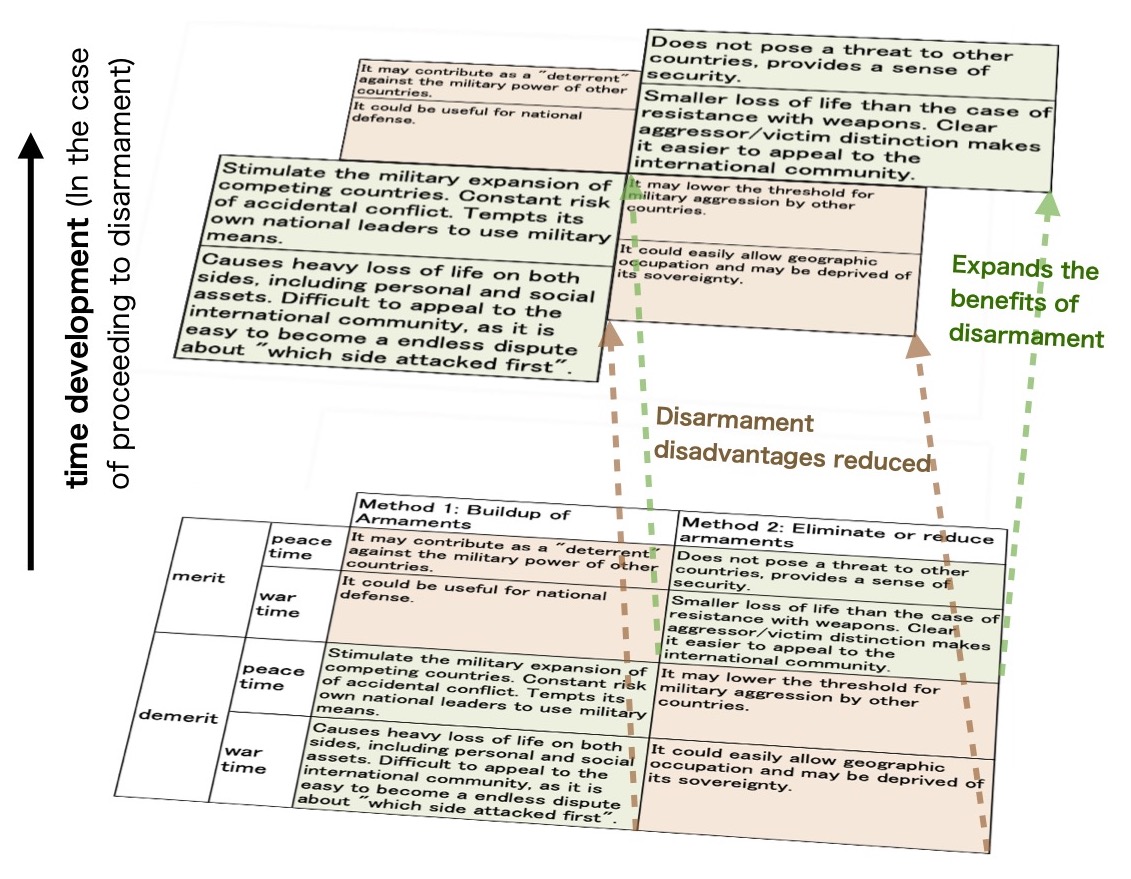
In addition, since military power is inseparable from industrial technology, technological competition is inevitable, and to keep it at a certain level is to immediately fall behind. In other words, the military balance is a "balance" of ever-increasing power, and from this aspect, it is necessarily unstable. The only way to prevent this is to make a deliberate effort to shift to a reduced balance or to aim for the elimination of military forces. Fundamentally, it is the state of human knowledge that must be questioned, which is indifferent to nurturing such wisdom and only develops and refines the technology of the tools of murder without limits. I would like to establish the phrase "Weapons development research is a violence of knowledge".
It is easy to imagine that once military power has been expanded, it will be very difficult to reduce it. Also, to reiterate what the author said in the previous issue of this series (No. 34), every country's military is maintained under the guise of "defense" and never under the sign "Ministry of Aggression". But a simple consideration shows that mathematically it is 50%-50% whether it will be an army for invasion or defense[2]. Even if you build it with the intention of "defense", if you elect a dictatorial or belligerent leader, you are finished. There is no built-in safeguard in any country's military that would automatically switch off this massive violent apparatus if a dictator were to emerge. Just look at Putin in Russia today. No, the US, which is a "democracy", has always been a war state. Therefore, the argument for an arms buildup without such considerations is, I must say, a happy-go-lucky thinking. Kant's idea of Abolition of Standing Armies in his book "Zum ewiegen Frieden", written 200 years ago, must be the only answer.
6. Departure from "military Keynesianism."
We must also look at the pressure for military expansion from another spontaneous economic dimension: the pressure of the "military-industrial complex. The term "military Keynesianism" has recently been coined. It is an attitude that counts the military industry as one of the engines for the maintenance and development of the economy. To put it bluntly, it is a "vampire economy". The military-industrial complex was warned about by U.S. President Eisenhower in his 1961 "Military-Industrial Complex" speech before he left office, and was recently covered in detail and in an easy-to-understand manner by the Japanese commercial TV program "Akira Ikegami's Extra Special" in 2016[3].
It has recently become public knowledge that there were influential figures in the political and business world who spoke of this "military Keynesianism" in overtly war-waiting terms. In fact, this information was obtained by the author eight years ago on social networking sites, and is the testimony of someone who was an interpreter for a private opera tour. In August 1996, during a meal at a restaurant during the trip, the person suddenly began to tell the following story.
"It is time for a war to break out somewhere, otherwise Japan's economy will not be able to survive. We can't afford to have a war breaking out on Japanese soil, so if it happens in India, it would be the most welcome development for our country."
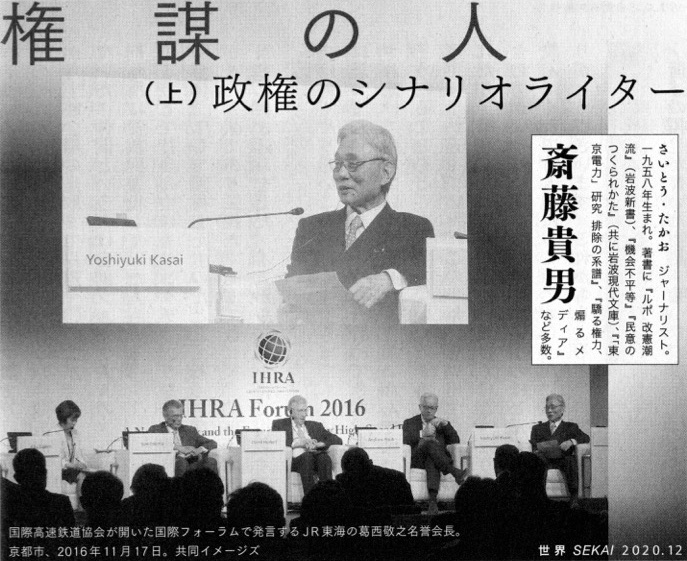 Although his real name was withheld on SNS, the details, including his real name, Yoshiyuki Kasai, became public in an article by Takao Saito in the December 2019 issue of Iwanami's "Sekai" and the following month's issue(photo on the right). Kasai wielded power during the privatization of Japan National Railways, serving as president of Central Japan Railway Company, and later, in 2006, as a member of the National Public Safety Commission and the Education Revitalization Council. He was also the founder of the Shiki no Kai, Shinzo Abe's business world support group. (He died of illness in May of this year). The fact that the true intentions of such a person who has been involved in the core of state power for such a long time are actually such a horrifying thing should be known to more people. Of course, neither he nor anyone else would ever "officially" utter such words, so the testimony of this interpreter is valuable.
Although his real name was withheld on SNS, the details, including his real name, Yoshiyuki Kasai, became public in an article by Takao Saito in the December 2019 issue of Iwanami's "Sekai" and the following month's issue(photo on the right). Kasai wielded power during the privatization of Japan National Railways, serving as president of Central Japan Railway Company, and later, in 2006, as a member of the National Public Safety Commission and the Education Revitalization Council. He was also the founder of the Shiki no Kai, Shinzo Abe's business world support group. (He died of illness in May of this year). The fact that the true intentions of such a person who has been involved in the core of state power for such a long time are actually such a horrifying thing should be known to more people. Of course, neither he nor anyone else would ever "officially" utter such words, so the testimony of this interpreter is valuable.How can we remove these factors of war embedded in the economy? It goes without saying that the realization of a politics oriented toward peace and disarmament is decisive, but on the other hand, the military industry and its associated capital itself has a decisive influence on politics. Therefore, we need a citizens' movement that targets them directly. For example, there would be room for efforts to prevent such corporations from attracting funds. In the investment world as in other social and economic activities, we hear calls for SDGS and ESG (Environmental, Social, and Governance), although in reality they may only be superficial. The latter has an "S" in the sign itself, or sociality, which is understood to be the "response to human rights issues". The former also includes the slogan "Peace, Justice and Strong Institutions". These slogans are not seen as overtly critical of or hostile to the military industry, nor are they seen as having any accompanying connotations or language at this time. But weapons beyond those needed for police and others, i.e., bombers, missiles, and other obvious weapons of mass destruction (the atomic bomb is not the only weapon of mass destruction), and the companies that manufacture them, cannot be consistent with "peace and justice" and "addressing human rights issues".
Today, while many people are not even able to eat their daily meals, Japan's investor population is estimated at 27 million (according to a 2021 survey by Nomura Asset Management). Not only so-called "investors," but many of them may have allocated a portion of their bank deposits to investments, as interest rates on deposits are virtually zero. If even a fraction of these people would stop investing in the military industry and stop using mutual funds that incorporate stocks of military companies and their supply chains, it would serve as a brake of some sort. If such actions become public as a social movement, it is expected to have the effect of making visible the connection between military supply companies and war. ICAN and other groups are promoting a campaign to disinvest in nuclear weapons companies, and this campaign should be expanded to include arms companies in general. Any "efficient" killing device greater than a machine gun should be considered a weapon of mass destruction.
Let us recall the phrase in the preamble of the UNESCO Charter: “Since wars begin in the minds of men, it is in the minds of men that the defences of peace must be constructed”. This is not spiritualism or idealism, but the only path to lasting peace. In other words, the world will not be peaceful unless there are more pacifists. The same is true for nations, and I think it is critically important to increase the number of pacifist nations.
Notes
[1] “HOWS2022 Summer Seminar Report, http://www.hows.jpn.org/shoko/1080howsseminar.html
(in Japanese)
[2] K. Toyoshima, “Peace Education in Math Classroom” J. Japanese Scientists, 2005, Jan., p.47.
English version: http://ad9.org/pegasus/F365/peace-ed-math.pdf
[3] Aired on Fuji-TV on February 12, 2016.
2022-11-25 16:57
nice!(0)
コメント(0)

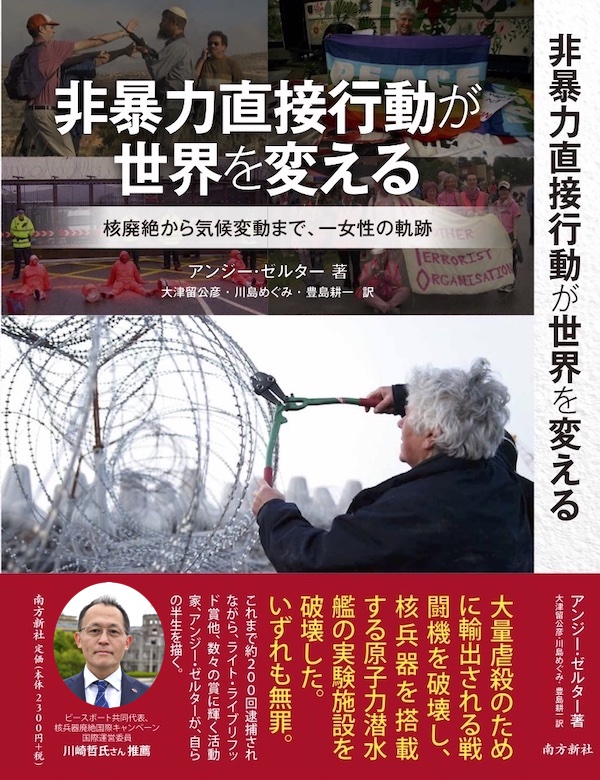

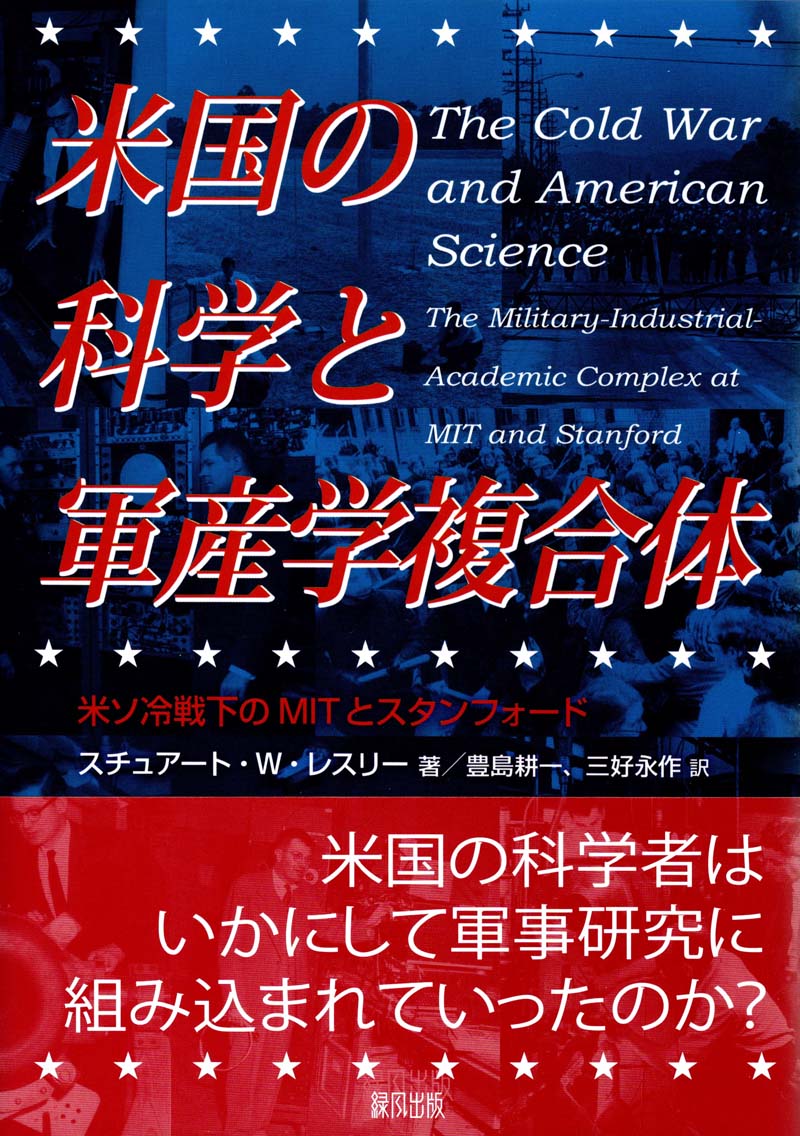


 9条守ろう! ブロガーズ・リンク
9条守ろう! ブロガーズ・リンク



コメント 0